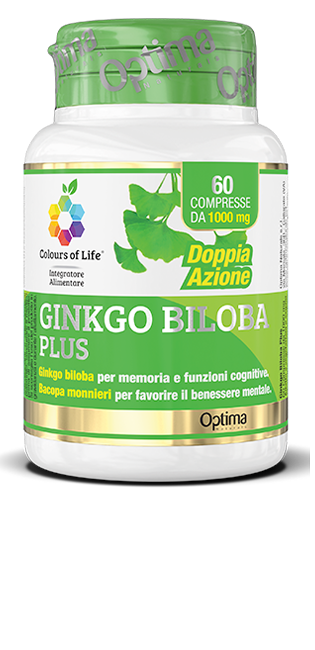BLOG
Ginkgo biloba: the plant to improve memory and concentration

What is Ginkgo biloba?
The Ginkgo biloba plant is one of the oldest trees on earth. Originally from China, it is now cultivated all over the world and is a tall, majestic tree considered sacred due to its strength and endurance. It is able to absorb and eliminate air pollution.
The beneficial properties for the organism are given by its leaves and seeds which look like silver apricot-like fruits and also give it the name 'silver apricot'.
What Ginkgo biloba is used for
Ginkgo biloba is useful and recognised for its important action on brain function, anti-inflammatory properties and reduction of anxiety and stress. It may also counteract free radicals.
Properties of Ginkgo biloba
Ginkgo biloba contains high levels of flavonoids, terpenes and polyphenols, proteins, B vitamins, vitamin C and minerals, including potassium and phosphorus.
Benefits for memory and concentration and more
This natural remedy can be useful for strengthening memory and concentration and improving learning and attention skills. A study testing its effect on psychiatric disorders confirms its usefulness in states of dementia and schizophrenia. It may be indicated in degenerative brain conditions such as Alzheimer's.
It can act positively on blood circulation by improving the health of the heart and arteries and alleviating circulation disorders such as heaviness in the limbs or water retention; it can relieve symptoms of PMS and in some cases headaches.
It also has antioxidant properties and is recommended for combating certain eye disorders such as glaucoma.
How to use
The dried leaves can be consumed as an infusion or the dry extract is used in the preparation of food supplements.
Ginkgo biloba in synergy with Bacopa monnieri: top memory and cognitive function.
Ginkgo biloba can be used in synergy with the plant Bacopa monnieri. This plant is also known by its Indian name of Brahmi and is widely used in Ayurvedic medicine. Bacopa monnieri titrated into bacosides has active ingredients and nutrients that contribute to the well-being of the nervous system, improve cognitive functions and are able to regulate serotonin levels, the good mood hormone.
Warnings, contraindications, side effects
It should only be consumed as an infusion or supplement, as the seeds may contain toxic substances and trigger severe allergic reactions.
Side effects included stomachache, nausea, diarrhoea and headaches.
Ginkgo biloba is contraindicated in pregnancy and lactation. It interferes with a number of medications, particularly anticoagulants, anti-platelet agents, anti-platelet agents and antidepressants. Always seek the advice of your doctor before taking it.
Article written in collaboration with BenessereCorpoMente.it
Sources and insights
PubMed, Neuropharmacological review of the nootropic herb Bacopa monnieri
The advice is for information only and should not replace medical assistance. Please consult a doctor or health care professional before trying any remedies.









 Optima Naturals S.r.l. ® Via Sempione 124, 21029 Vergiate (VA)
Optima Naturals S.r.l. ® Via Sempione 124, 21029 Vergiate (VA)